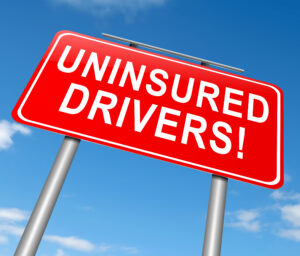Being in a car accident can be stressful under normal circumstances, but when it’s discovered that the party responsible for the accident does not have car insurance, the frustration level and the complexity of the situation become even more heightened.
What should you do when you are in an accident with a driver who is uninsured? What legal recourse do you have in the situation, and what are the chances of receiving the fair financial compensation you deserve for the damage you have suffered? These are important questions to have answered as you seek to find a resolution in the aftermath of your car accident.
If you have been in a car accident with a driver who did not have auto insurance at the time of the incident, you may still have legal options to hold the responsible party accountable. Working with an experienced car accident lawyer in Marietta allows you to explore every avenue to seek your desired outcome. From the initial steps to take after the accident and gathering evidence to taking the appropriate legal action, a knowledgeable car accident attorney will have the insight and understanding to guide you in the right direction.
Continue reading below to learn more about what to do if you were hit by an uninsured motorist, and contact a skilled car accident lawyer today to schedule a consultation to discuss your specific case.
The Prevalence of Uninsured Motorists
As time has passed, uninsured motorists have become a more significant and pervasive risk on American roadways. Statistics show a surprising number of drivers operating their vehicles without having valid auto insurance, which endangers everyone on the road. Not only are other travelers put at risk, but there are additional negative aspects that trickle down to other facets of society. Law-abiding citizens who do carry auto insurance end up paying higher premiums to cover the cost insurance providers encounter from uninsured motorist accidents. This failure on the part of so many motorists to adhere to the legal requirement to carry insurance also leaves innocent individuals vulnerable to physical and financial harm in the event of an accident.
Understanding the problems presented by uninsured motorists is vital for all drivers because it emphasizes the necessity of complying with the law and the process involved with dealing with the aftermath of an accident when the other party is uninsured.
The Importance of Knowing How to Handle an Accident with an Uninsured Motorist
Being involved in a car accident with an uninsured motorist can be an aggravating experience. It underscores the need to be well-prepared to address such a situation. The impact of an accident with an uninsured driver extends even further than the immediate aftermath of the wreck, harming victims financially and potentially physically. Knowing how to handle the situation is essential because the other party’s lack of insurance coverage adds complexity to every process level. Individuals need to understand the specific steps to take at every stage of the process, from ensuring the safety of everyone at the scene of the accident and seeking medical attention to documenting the accident and taking the appropriate action from a legal standpoint.

A basic comprehension of uninsured and underinsured motorist coverage options available through your auto insurance provider can also be helpful. In a landscape where accidents with parties who are not insured are becoming more commonplace, having this knowledge gives drivers a better chance to protect their rights, avoid potential challenges, and take the appropriate steps to pursue fair compensation.
Key Steps & Considerations
In the immediate aftermath following a car accident with an uninsured motorist, taking decisive and well-informed action is critical for a smoother process of seeking a resolution. The initial steps include what are often the standard tasks following any traffic accident, including prioritizing the safety of everyone at the scene, receiving medical attention, contacting law enforcement, and gathering evidence and contact information for all involved parties. Documenting the scene with photos and videos and collecting witness statements are also vital.
Notifying your insurance company of the accident can put the wheels in motion if you have any uninsured/underinsured motorist provisions in your policy. Contacting an experienced car accident lawyer will help you better understand your options for legal recourse, including pursuing a personal injury lawsuit or seeking financial compensation through arbitration. Ultimately, having solid legal representation for your case goes far beyond a strategic step, providing guidance and insight as potential pitfalls and challenges arise.
Understanding Uninsured Motorist Accidents
Uninsured motorist accidents create significant challenges for law-abiding drivers in the aftermath of a crash. With the absence of auto insurance coverage on the at-fault party’s side, such an accident often leaves the injured party carrying a far greater financial burden and a complicated legal journey to seek a fair resolution. With statistics showing the prevalence of such incidents on the rise in the United States, taking a proactive approach to addressing the situation is crucial.
Differentiating between uninsured motorists and drivers who are underinsured is also important, as it directly impacts the available legal avenues. Apart from the immediate safety concerns and medical assessments necessary at the accident scene, understanding the consequences and damage caused by operating a vehicle without insurance coverage is perhaps the most crucial aspect of such a scenario. Being aware of the details of your insurance policy is another critical step toward addressing potential challenges resulting from an accident with an uninsured motorist.
Immediate Actions After an Accident
Many people know the most important steps to take immediately following a car accident, but briefly reviewing them can still be beneficial. If you have been involved in a crash, you should immediately focus on the following tasks:
- Get everyone out of harm’s way and to a safe place
- Assess any obvious injuries suffered by anyone at the scene
- Contact law enforcement
- Receive medical attention and a more detailed health assessment
- Obtain identification and contact information for the other parties involved
- Capture the details of the accident scene with photographs and video footage
- Collect contact information for any eyewitnesses at the scene
- Notify your insurance company of the accident
- Contact a knowledgeable car accident lawyer
Completing the list of items above quickly can help you lay a strong foundation for any legal proceedings that may be initiated later on. If the other driver who hit you is uninsured, make sure law enforcement and your insurance provider are made aware of that fact.
Notifying Your Insurance Company
Contacting your insurance provider promptly and informing them of the accident you were involved in with an uninsured motorist is an important early step. This action gets the ball rolling for accessing any uninsured/underinsured motorist provisions you may have in your auto insurance policy. Provide your insurance company with as much detailed information about the accident, including the police report and any evidence you collected at the accident scene. Along with your car accident attorney and law enforcement, your insurer will be a critical ally in your pursuit of compensation from the uninsured party.

Knowing the intricacies of your coverage policy is essential for maximizing any benefits available and increasing your chances of obtaining a favorable outcome to your situation. Making contact with your insurance provider in a timely manner will get your case started on the right path.
Legal Recourse for Uninsured Motorist Accidents
With the aftermath of an accident involving an uninsured motorist so uncertain and complex, exploring all legal options available to you is vital. If you suffered an injury in the accident, filing a personal injury lawsuit against the uninsured party can be a viable option, as compensation awarded following a successful suit can be used to cover medical expenses and lost income. If your auto insurance policy contains provisions for uninsured/underinsured motorist accidents, that can present a practical and expedient path to a resolution. Additional legal options include pursuing a resolution via alternative means, such as arbitration or mediation.
Each different approach has its nuances, along with potential pros and cons. Consulting with your car accident attorney will give you a more detailed understanding of your options and help you make well-informed decisions.
State-Specific Considerations
As with any type of situation involving laws and regulations, legal options following a car accident caused by an uninsured motorist require awareness regarding state-specific laws. Every state and jurisdiction can vary — slightly or significantly — in regulations, requirements, limitations, and the processes involved with pursuing legal remedies following such an accident. Knowing how these variations can affect your specific case is a critical element that your lawyer can walk you through. Your attorney will be well-versed in the specific details of your jurisdiction. These state-specific considerations emphasize the importance of having a basic understanding of your situation and the necessity of having professional legal representation.
By working with a lawyer who is experienced in helping individuals navigate the intricacies of state-specific laws regarding uninsured motorist accidents, you can become well-informed and ensure you are taking the right steps following the laws that apply to your specific case.
Seeking Legal Representation
While having a car accident lawyer on your side is beneficial following any type of traffic accident, being involved in an accident caused by an uninsured driver makes it even more indispensable. From understanding state-specific laws and regulations to navigating the complexities of insurance requirements and negotiations, your car accident attorney will serve as a trusted guide for your case and a protector of your rights. Your lawyer will assess your case, investigate the details of your accident, explore potential legal recourse, explain the options that may be available to you, and lead you in the direction that is best suited for your unique situation.
While legal services come at a cost, the benefits of having reliable representation and advocacy on your side far outweigh any drawbacks.
Potential Challenges & Pitfalls
Though some potential challenges presented by a car accident with an uninsured motorist are obvious, other difficulties may arise. From the inability to positively identify the driver to disputes over compensation, these factors create unique obstacles that will need to be addressed. Finding your way through these complex challenges requires a strong, steady approach with professional guidance.
Working with a knowledgeable car accident lawyer is always your best option when dealing with a situation that includes so many variables and unique problems. Your attorney can work to safeguard your rights and help you seek the most favorable outcome available to you simultaneously.
Contact a Knowledgeable Car Accident Lawyer for Help

Darl Champion, Car Accident Lawyer
Navigating the aftermath of any type of car accident is often frustrating and overwhelming. If the driver of the car that hit you is uninsured, things become even more stressful and can leave you uncertain about what to do or where to turn for help. Knowing the steps you should take both immediately after the car accident and in the days and weeks following the wreck is critical when the time comes to pursue the rightful compensation you need to move forward from an accident that left your life turned upside down.
When you have solid legal representation on your side, you can receive the knowledgeable guidance you need to find the best path forward and significantly improve your chances of obtaining the resolution to your case that you need. Even in a situation involving an uninsured motorist, you can still take legal action to hold them accountable and seek financial compensation to help you pay your medical bills, cover lost income, and repair property damage to your vehicle. Get the help you need today by contacting an experienced car accident lawyer, scheduling a consultation to discuss your accident, and learning more about the available options.
Don’t hesitate to reach out to a car accident lawyer for a free consultation. They are here to alleviate your concerns, answer your questions, and provide the legal representation you need to secure the compensation you deserve. Remember, consultations are always free, so you have nothing to lose and everything to gain by seeking legal advice.
About the Author
The Champion Firm is a full-service personal injury law firm serving the greater Metro Atlanta area. Our award-winning team of attorneys specializes in car accidents, wrongful death, premises liability, and slip-and-fall cases. Learn more about our team here.